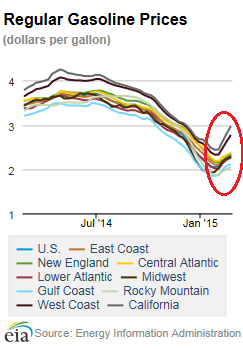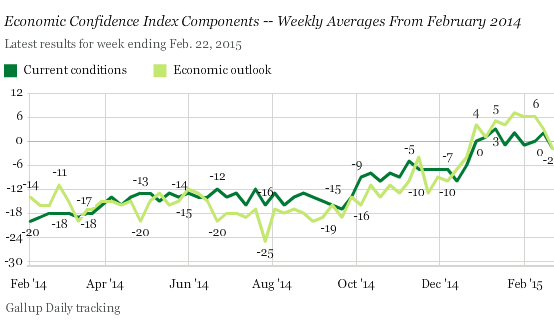Without a lot of fanfare, average gasoline prices bottomed at the end of January and have been rising steadily ever since. They’re still a lot lower than they were a year ago, from $0.89 per gallon lower on the West Coast to $1.24 lower in New England, according to the EIA. But the turnaround has been swift.
Numbers vary, depending on who is doing the counting. According to the AAA’s Daily Fuel Gauge Report, the average price for regular hit $2.312 today, up 1.1 cents from yesterday, and up 27.5 cents from a month ago. That’s a jump of 13.5%. But it isn’t evenly spread across the nation: the EIA found that gas prices in New York rose only 5% from the bottom; in Ohio, they soared 24%.
Gasoline prices tend to rise in late winter. But this time, months of plunging gas prices – a function of the collapsing price of oil – created good vibes that are suddenly being deflated.
Gallup developed its Economic Confidence Index in 2008 during the Financial Crisis. Not surprisingly, given what most consumers face, the weekly index has been deeply in the negative throughout its life. Well almost. In 2014, it still ranged from -14 to -21, despite other consumer confidence indices that were soaring. But late in the year, perhaps as the plunge in gasoline prices was doing its magic, it began to rise. And in late December, the index made it all the way into positive territory, for the first time ever – and inched up further in 2015.
Until now. For the week ending February 22, it fell 5 points to -2, the largest drop since July, and once again back in the negative. Gallup explains that the index is “usually fairly stable, not changing more than a couple of points unless there is some significant event.”
The index is composed of two components: “how Americans rate current economic conditions and whether they say the economy is getting better or getting worse.” This year, unlike prior years, the economic outlook index was consistently above the current conditions index, ranging in positive territory between +2 and +6. The current conditions index ranged between -1 and +1. Now both have dropped to -2. Over the past two weeks, the outlook index dropped from +6 to -2, down 8 points.
In the latest week, 27% of Americans said the economy was “excellent” or “good,” while 29% said it was “poor.” Hence the current conditions value of -2. And 47% of Americans said the economy is “getting better” while 49% said it is “getting worse.” Hence the economic outlook value of -2.
And the “significant event” that could have triggered the decline? Gallup explains:
Americans’ lower confidence in the economy last week is most likely a reaction to the rise in gas prices. Even though gas prices remain well below where they were a year ago, the recent increase has been fairly sharp – though perhaps less than the normal late winter increase – and the shift from declining to rising prices may simply be discouraging to consumers.
And so, “if gas prices continue to rise and the weather” – again, the weather – “ends up adversely affecting first quarter economic growth, economic confidence could struggle to get back into positive territory.”
And then that would be it for American consumers? After years of post-financial-crisis struggles, finally some light at the end of the tunnel and a few weeks of positive economic outlook in early 2015, caused by plunging gas prices, according to Gallup, before it all starts to crumble again.
The Gallup survey provides a much darker contrast to the Conference Board’s Consumer Confidence Index. It has been showing that consumers had regained their pre-crisis euphoric levels, as January’s confidence index hit the phenomenal level of 103.8, something last seen in 2007. But in February, consumers toned down their presumed euphoria. And the index, released today, dropped 7.4 points to 96.4. The report didn’t mention rising gasoline prices. So there may be other factors at work that dented this Conference-Board defined consumer euphoria.
Peaking economic confidence – at whatever miserably low or euphorically high level these disparate surveys place it – would indeed be a crummy development, just when consumers were expected to borrow even more and spend even more to propel the economy once again to its ever elusive “escape velocity.”
There are already unpleasant rumblings. In Texas, one of the growth engines of the US economy in recent years, manufacturers saw new orders and shipments plunge to the “lowest reading since June 2009,” according to the Dallas Fed. And executives are getting worried. Read… Oil Bust Mauls Texas Manufacturers, Atlanta Fed Sees Hit to US Economy
Enjoy reading WOLF STREET and want to support it? You can donate. I appreciate it immensely. Click on the beer and iced-tea mug to find out how:
Would you like to be notified via email when WOLF STREET publishes a new article? Sign up here.
![]()




The falling gas prices were nice while they lasted but it doesn’t make up for no raises, no overtime, the doubling of health care premiums, and the rising prices of everything else.
Disconnect Between Productivity and Typical Workers’ Compensation (1973-2013): While Productivity Went Up 243.1%, Hourly Compensation Only Rose 108.9%
Source: Wage Stagnation in Nine Charts [Economic Policy Institute]
http://www.epi.org/publication/charting-wage-stagnation/
Or, put another way: “From 1973 to 2013, hourly compensation of a typical (production/nonsupervisory) worker rose just 9 percent while productivity increased 74 percent. This breakdown of pay growth has been especially evident in the last decade, affecting both college- and non-college-educated workers as well as blue- and white-collar workers. This means that workers have been producing far more than they receive in their paychecks and benefit packages from their employers.”
Welcome to Hope and Change.
Agreed. Inflation? What inflation — the government tells you there isn’t any, while you see things going up-up-up in cost. The “reports” being released by quasi-governmental groups are nothing but lies. They say whatever they’re supposed to say, then revised even more. I think Americans have caught-on but have no options.
Au contraire, Americans DO have options! PLENTY of options. You see, NOTHING changes, until YOU change. STOP FEEDING THE BEAST!
Withdraw Your Consent: 25 Ways to Declare Your Independence
http://www.silverdoctors.com/withdraw-your-consent-25-ways-to-declare-your-independence/
50 Ways to Starve the Beast
http://www.theorganicprepper.ca/50-ways-to-starve-the-beast-04052013
Let’s Stop Fooling Ourselves: Americans Can’t Afford the Future
http://www.peakprosperity.com/blog/81190/lets-stop-fooling-ourselves-americans-cant-afford-future
89 Tips That Will Help You Prepare For The Coming Economic Depression
http://sgtreport.com/2015/01/89-tips-that-will-help-you-prepare-for-the-coming-economic-depression/
Read all the comments in the ‘comments’ section which follows each of the articles (above), for MANY SOLUTIONS, that anyone may use, starting today.
Next up may be the dreaded stagflation – stagnant economy (check as we may be tiptoing into it) with high unemployment (check sans souped up #s) and rising inflation (check sans manipulated #s) …
Last stagflation was in the late 70’s triggered by OPEC embargo. I recall getting a driver’s license and soon waking up early in the morning to que up at local Exxon gas station. I digress. Anyway any spark in placid middle east will result in gas price spiking. Oil glut orchestrated to punish Putin with Saudi’s help? OPEC members are hurting badly and one cannot rule out some kind of conspiracy with actors like Saudi, Iranians and ahem CIA.
I suspect the expectations of expected consumer confidence has reached all time highs, resulting in unexpected disappointment in expected consumer confidence.
The consumer has been blissfully happy for about 20 years now. The people watching the consumers are going increasing insane doing so.
“I suspect the expectations of expected consumer confidence has reached all time highs, resulting in unexpected disappointment in expected consumer confidence. ”
I suspect that my expectations did not consider the unexpected decline in expectations, although many
economist likewise did not expect the unexpected decline, or perhaps expectations are over-rated as a means to anticipate fundamentally unexpected events.
:)
Could be the Steelworkers’ strike reducing refinery thruput. Could be the cold weather. Could be refinery maintenance. It’s convenient for refineries that they could find a way to raise prices on their output and lower prices on their input, thus increasing profit margins. Too convenient. Oil market manipulation? Can’t be!
http://gcaptain.com/oil-tankers-idle-months-off-delaware-waters-puzzling/
Inflation is a bitch and then you die.